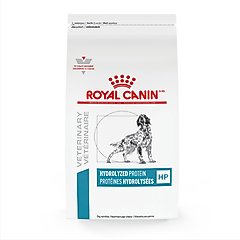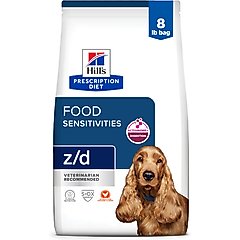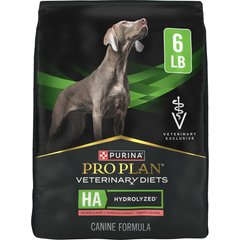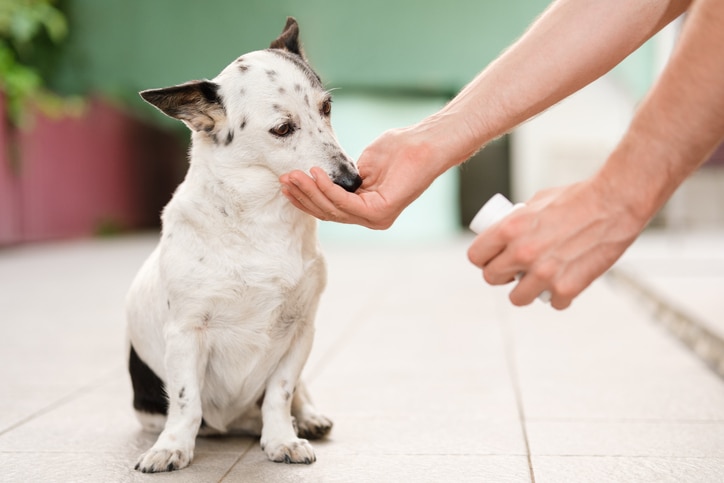Everything To Know About Dog Chicken Allergies: Symptoms, Treatment, and More

Photo by Sergeeva/iStock/Getty Images Plus
Because chicken is lean and packed with protein, many pet health brands add it to their dog food and treats.
But if you’re feeding your pup one of these protein-packed foods and notice they have chronic itching, ear infections, and/or lingering digestive issues (like a little too much smelly gas), it’s possible you’re dealing with a dog chicken allergy.
Food allergies can be tricky to diagnose and take commitment to manage, but with the right information and support, your dog can live a comfortable, itch-free life.
Here’s everything you need to know about dog chicken allergy symptoms, treatment, and more.
Can Dogs Be Allergic to Chicken?
Yes, dogs can be allergic to chicken. In fact, it’s one of the most common dog allergies, according to Shalsee Vigeant, DVM, medical director at Veterinary Emergency Group in Sugar Land, Texas. Chicken accounts for 17% of allergic reactions in dogs. (Beef reactions are the most common at 34%.)
If a dog is allergic to chicken, their immune system mistakenly identifies the proteins in chicken as harmful, leading to a widespread inflammatory response. This could be due to genetic predisposition or environmental factors, and exposure to certain ingredients over time can increase the likelihood of developing an allergy, according to Sam Varon, DVM, practicing veterinarian at Broadway Veterinary Hospital in Sacramento, California.
Can Puppies Be Allergic to Chicken?
It’s also possible for puppies to be allergic to chicken, but it isn’t as common as it is in adult dogs. Allergies typically take time to manifest as the immune system becomes sensitized to a particular protein, Dr. Varon says.
Because of this, most dogs develop food allergies between 6 months and 3 years of age, but allergies can develop later in life as well. If a puppy develops an allergy, it’s unlikely they’ll outgrow it.
Dog Chicken Allergy Symptoms
Signs of a chicken allergy can have an extensive range, and they’re not always obviously tied to the food. Unlike with human reactions, they may not happen immediately, either.
Some of the most common signs of a chicken allergy in dogs are:
- Itchy skin, especially around the paws, face, ears, anus, and underbelly
- Ear infections that recur frequently
- Gastrointestinal issues, such as vomiting, diarrhea, and/or excessive flatulence
- Chronic licking or scratching
- Red, inflamed skin or hot spots
- Scabbing/crusting on the skin
- Chronic anal gland issues
When To Take Your Dog to the Vet
Anaphylactic food allergies are very rare in dogs, so an allergic reaction doesn’t usually escalate into an emergency situation.
That said, if your dog has been scratching so severely that they’re bleeding or injuring themself, an emergency veterinarian can provide relief and offer options to treat the immediate problem (itching, bleeding, pain, etc.), Dr. Vigeant says.
How Vets Diagnose a Chicken Allergy in Dogs
Because there’s no blood test that can identify a chicken allergy, proper diagnosis can take a little trial and error (and a lot of patience from you and your pup!).
The elimination diet is the gold standard for diagnosing food allergies, says Dr. Varon. Because diagnosis relies so heavily on it, it’s important to adhere to the diet exactly as your veterinarian recommends. That said, here’s the general process:
- Elimination: Your dog is put on a hypoallergenic diet, usually consisting of a novel protein (one the dog has never eaten before) or hydrolyzed diet (proteins are broken down into very small, non-allergenic particles) for eight to 12 weeks. This gives ample time for any allergy symptoms to go away.
- Re-challenge: Once the 12 weeks are up and symptoms improve, chicken is reintroduced to the diet to see if the symptoms return. If they do, this confirms the allergy.
Diagnosis may also include cytology (skin scrapes or biopsies for microscopic examination of skin cells) and/or additional skin testing with a dermatologist.
Dog Chicken Allergy Treatment
If an allergy is confirmed, the most effective (and really only) treatment is strict avoidance of chicken in the dog’s diet. This includes not just chicken meat but also any food, treats, or supplements containing chicken byproducts or chicken fat.
If secondary infections (like ear or skin infections) develop from the allergy, your vet may recommend antibiotics or antifungal treatments to clear the infections and make your dog more comfortable.
Some dogs may also benefit from antihistamines, steroids, or immunosuppressants to reduce itching while the diet changes take effect, says Dr. Varon.
What To Feed a Dog Allergic to Chicken
Because the protein is in so many foods and treats, a chicken allergy can be hard to manage at first. Fortunately, many trusted dog health brands have developed specialized dog food for chicken allergies. These are typically hydrolyzed protein or novel protein foods, which is the recommended diet for allergic dogs.
- Novel protein diet: These may include proteins like venison, rabbit, duck, or even kangaroo, which the dog has likely never eaten before.
- Hydrolyzed protein diets: These diets contain proteins that are broken down into smaller particles that are less likely to trigger an allergic response.
Some brands and products our experts recommend are:
- Royal Canin® Hydrolyzed Protein
- Hill’s® Prescription Diet® z/d
- Purina® Pro Plan® Hydrolyzed® HA
- Royal Canin Anallergenic
Dr. Vigeant says the Purina HA and Royal Canin Anallergenic are top-of-the-line and best for severe allergies. But as always, be sure to consult your own veterinarian for a diet that is nutritionally balanced and appropriate for your dog’s specific needs.
Recommended Products
FAQs About Dog Chicken Allergies
If my dog is allergic to chicken, is turkey safe for them to eat?
Not necessarily. Chicken and turkey are both poultry and have similar protein structures, Dr. Varon says. If a dog is allergic to chicken, there’s a risk they could also be allergic to other poultry proteins, like turkey or duck.
It’s best to avoid all poultry unless directed by a veterinarian after a successful elimination diet trial, he says.
What is the most common dog allergy?
Beef is the most common dog food allergy, accounting for 34% of all food allergies in dogs. The most common skin allergy is flea allergy dermatitis (FAD), which is an inflammatory reaction to flea bites.
What percentage of dogs are allergic to chicken?
The exact prevalence is unknown and may differ based on the region, diet, and breed of the dog, according to Dr. Varon. That said, it’s estimated that 1–2% of all dogs have food allergies, and about 17% of those allergies are to chicken.
When do allergies develop in dogs?
According to Dr. Varon, most allergies develop between 6 months and 3 years of age, but it’s possible for them to manifest later in life as well. Generally, dogs are not tested for allergies until they’re at least 6 months old because of this.
This content was medically reviewed by Chewy vets.














